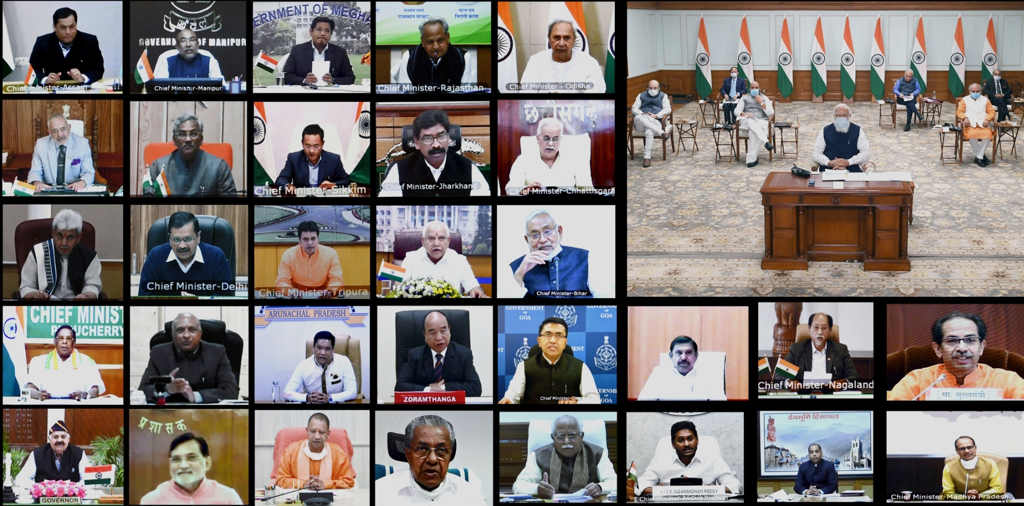The 6th Governing Council meeting of NITI Aayog on Saturday came with result of strengthening every state and Union Territory (UT) so that everyone can learn from each other's best practices.
The council members deliberated on strengthening institutions for skilling, reskilling, and upskilling of workforce. Focus was also laid on improving service delivery at the grassroots level, by ensuring digital infrastructure for the rural regions.
Various Chief Ministers presented best practices from their respective states that can serve as templates for replication across the country.
The agenda for the meeting comprised making India a manufacturing powerhouse, reimagining agriculture, improving physical infrastructure, accelerating human resources development, improving service delivery at grassroots level and health and nutrition
The council deliberated on several steps for making India a manufacturing powerhouse, such as reducing compliance burden, initiating reforms at the state level, improving logistics, promoting exports through district-level competition and creating jobs.
For improving physical infrastructure, the Chief Ministers took part in the meeting expressed the need to raise public capital investment and completing projects under the National Infrastructure Pipeline, while enhancing investments in infrastructure through private and Public Private Partnerships, improving last-mile connectivity, reducing energy costs and configuring an enhanced and efficient role of States in project implementation.
States and UTs also mentioned efforts made to improve water accessibility, supply of quality and reliable power, internet connectivity and bandwidth availability, quality healthcare services, sustainable agricultural practices to mitigate the risks of climate change, undertake suitable reforms to build an advanced manufacturing and innovation ecosystem, thereby bolstering exports through the One District One Product initiative apart from building on futuristic tech and inclusive governance models.
The Chief Ministers also noted marked improvement in the development of physical infrastructure, including digital connectivity, across the North-Eastern region, along with a greater thrust on the Act East Policy, with the aim of providing impetus to the economies of the NE States.
Keeping in mind the aspirations of a young country like India, Prime Minister Narendra Modi, who chaired the meeting via video conferencing, stressed on the need to build modern infrastructure.
He said the youth plays an important role in catalysing change in the country and cited the success of Digital India campaign to emphasise this point. "Innovation must be encouraged, and more technology should be used to provide better opportunities for education and skill development."
The meeting was attended by 26 Chief Ministers, three lieutenant governors and two administrators, apart from Union Ministers, who are ex-officio members, and special invitees. NITI Aayog Vice Chairman, Members and CEO, Principal Secretary to the PM and other senior officers from PMO; Cabinet Secretary; and Chief Secretaries of states and Union Territories also attended the meeting.
The meeting was moderated by Defence Minister Rajnath Singh.
The Prime Minister further said policy frameworks and better coordination between the Centre and States are very important and that the Centre and states must synchronise their budgets to ensure multiplier effect.
"Technology and community partnership are equally important."
The Prime Minister said the Central Government has introduced the Production Linked Incentive (PLI) scheme for various sectors, thus providing an excellent opportunity to increase manufacturing in the country. He urged the States to take full advantage of this scheme and attract maximum global investments and reap the benefits of reduced corporate tax rates.
The Prime Minister said geospatial data was liberalized recently, which would incentivise entrepreneurial endeavour, start-up innovation and the tech sector in general.
Focus must be on ease-of-doing business for the international audience and on ease-of-living for our own people, Modi added.
Even though India is an agricultural economy, it still imports many inputs, the Prime Minister said. He stressed on becoming self-reliant in this area.
The Prime Minister also urged focus on storage and processing of agricultural products to reduce wastage. Reforms are very important for farmers to get the necessary economic resources, better infrastructure and modern technology, he said.
The Prime Minister welcomed the rich discussion and constructive suggestions by the Council members, assuring that they would be carefully considered while taking decisions. He expressed confidence that with collective efforts, the aspirations of the people will be fulfilled.
This Governing Council meeting paved the way for synergies across all tiers of the Government, with substantial collaboration and cooperation in the Agenda items. The meeting provided an opportunity to address the objectives of advancing economic, social and demographic welfare.
Addressing the event, the Prime Minister further said that cooperative federalism is the foundation of India's progress.
In his welcome remarks, Vice Chairman, NITI Aayog, said that this forum enables the identification of key strategies for cohesive action.
He reaffirmed NITI Aayog's commitment to work tirelessly with states and UTs in the spirit of cooperative federalism and added that national progress is contingent on the growth of all states and UTs.
(IANS)




















